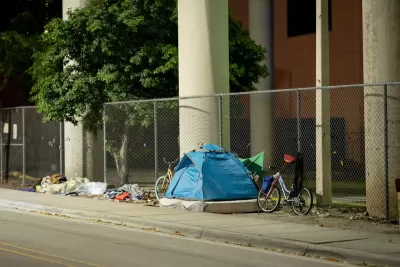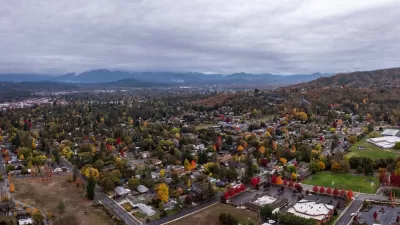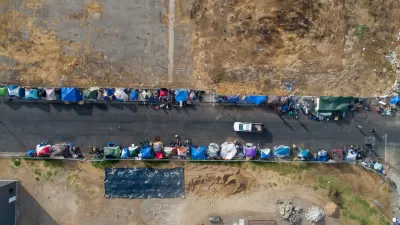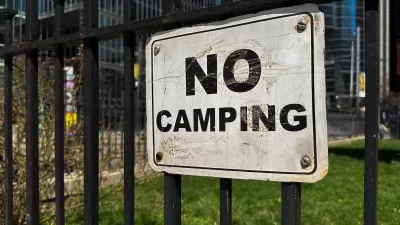Advocates for unhoused people are rallying to protect homeless populations as new legislation criminalizing homelessness rolls out around the country.

The Supreme Court’s decision in Grants Pass v. Johnson continues to have rippling effects throughout the country, prompting advocates for unhoused people to renew their efforts to alleviate the homelessness crisis and prevent the criminalization of homelessness.
As Roshan Abraham explains in an article for Next City, some state and local governments are taking advantage of the ruling to create more punitive laws and further criminalize homelessness and encampments. “This alarming acceleration of threats to unhoused people has pushed homeless advocacy groups to craft a menu of strategies to protect unsheltered residents. This includes developing new model legislation to prevent criminalization and calling for more federal funding to provide affordable housing.”
The ruling draws into focus the scale of the homelessness crisis in the United States. The article outlines cases in several cities where advocates have been fighting for the rights of unhoused residents. According to the article, “If cities want to reduce encampments without displacing people, the best approach is to provide permanent supportive housing. But absent that, there’s plenty of evidence that people are much more likely to accept offers of single rooms, including hotel and motel rooms, than congregate shelter.”
In many cases, people ‘refuse’ shelter because it doesn’t accommodate partners or pets, or or includes strict regulations such as check-out times and sobriety requirements. For advocates, the Grants Pass ruling brings the need to make local lawmakers understand the root causes of homelessness into sharp focus.
FULL STORY: The Supreme Court’s Grants Pass Decision Has Lit a Fire Under Homeless Advocacy Groups

Planetizen Federal Action Tracker
A weekly monitor of how Trump’s orders and actions are impacting planners and planning in America.

Congressman Proposes Bill to Rename DC Metro “Trump Train”
The Make Autorail Great Again Act would withhold federal funding to the system until the Washington Metropolitan Area Transit Authority (WMATA), rebrands as the Washington Metropolitan Authority for Greater Access (WMAGA).

The Simple Legislative Tool Transforming Vacant Downtowns
In California, Michigan and Georgia, an easy win is bringing dollars — and delight — back to city centers.

The States Losing Rural Delivery Rooms at an Alarming Pace
In some states, as few as 9% of rural hospitals still deliver babies. As a result, rising pre-term births, no adequate pre-term care and harrowing close calls are a growing reality.

The Small South Asian Republic Going all in on EVs
Thanks to one simple policy change less than five years ago, 65% of new cars in this Himalayan country are now electric.

DC Backpedals on Bike Lane Protection, Swaps Barriers for Paint
Citing aesthetic concerns, the city is removing the concrete barriers and flexposts that once separated Arizona Avenue cyclists from motor vehicles.
Urban Design for Planners 1: Software Tools
This six-course series explores essential urban design concepts using open source software and equips planners with the tools they need to participate fully in the urban design process.
Planning for Universal Design
Learn the tools for implementing Universal Design in planning regulations.
Smith Gee Studio
City of Charlotte
City of Camden Redevelopment Agency
City of Astoria
Transportation Research & Education Center (TREC) at Portland State University
US High Speed Rail Association
City of Camden Redevelopment Agency
Municipality of Princeton (NJ)





























